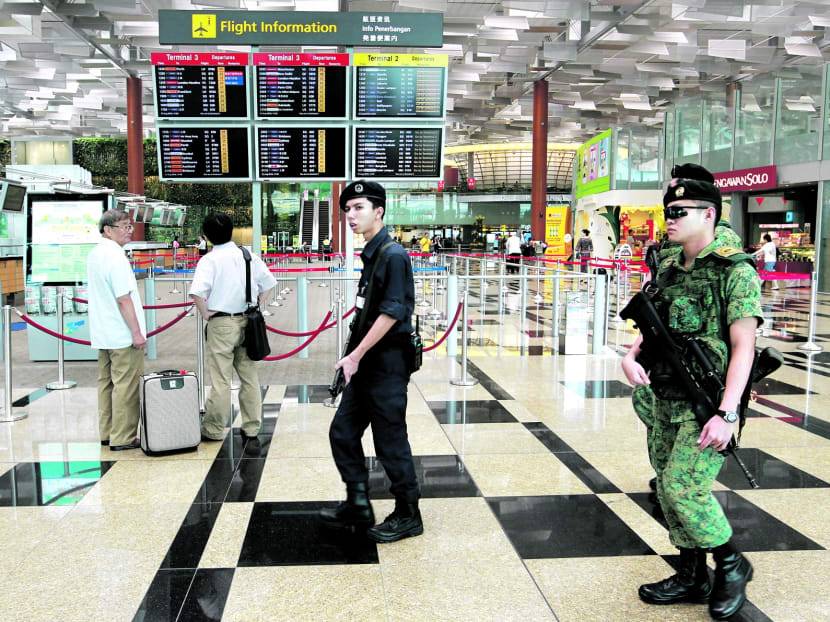Global trends ‘making S’pore less peaceful’
SINGAPORE — With the world at large becoming more dangerous with increased unrest and violence, the Republic is not spared the effects of the global trend.

A rise in the number of homeland security personnel was cited by the report as a factor contributing to a fall in Singapore’s Global Peace Index score. Today File Photo
SINGAPORE — With the world at large becoming more dangerous with increased unrest and violence, the Republic is not spared the effects of the global trend.
Singapore is a less peaceful place compared with a year ago because of factors such as a higher proportion of homeland security personnel and police officers, less trust among citizens and greater militarisation.
This is based on the latest annual Global Peace Index (GPI), which is used by reputed international organisations such as the United Nations, World Bank and Organisation for Economic Co-operation and Development.
The eighth edition of the index — published on Wednesday by Sydney-based independent think-tank, the Institute for Economics and Peace — saw Singapore drop six places to 25th out of 162 countries. The Republic had made the top 20 positions last year as well as in 2012, when it came in 16th.
The institute looked at 22 different indicators — which are weighted according to importance — under three sections: Ongoing domestic and international conflict, societal safety and security, as well as militarisation.
Singapore attained an overall score of 1.545. The world’s most peaceful country, Iceland, received a score of 1.19, while the least peaceful, Syria, scored 3.65.
The Republic remains the fourth-best performer in the Asia-Pacific, behind New Zealand (4th), Japan (8th) and Australia (15th). It is also the most peaceful country in South-east Asia.
Nevertheless, along with Japan, South Korea and China, Singapore and several other South-east Asian neighbours — Malaysia, Vietnam, Thailand, the Philippines and East Timor — saw their scores deteriorate.
The GPI report noted the absence of major conflicts in the Asia-Pacific, but pointed to a trend towards the modernisation of armed forces in the region.
Pointing out that the decline in Singapore’s score was among the highest in the region, the report cited an increase in the number of homeland security personnel and police officers per 100,000 people, which indicates a more fearful environment, higher level of perceived criminality and a slight increase in militarisation.
Perceived criminality measures the level of trust among citizens. The institute said this was qualitatively measured by the Economist Intelligence Unit’s country experts between March 16 last year and March 15 this year. The results were then peer-reviewed by the GPI expert panel consisting of international affairs as well as peace and conflict study academics based in several countries across the world.
Last year, Deputy Prime Minister and Home Affairs Minister Teo Chee Hean cited Singapore’s good performance in the 2013 GPI at an award ceremony for those who had made large contributions to Singapore’s safety and security.
A Ministry of Home Affairs spokesperson said it was aware of the latest index. She pointed out that Singapore has had a low crime rate for many years, with the crime rate falling to a 30-year low last year, despite an increase in population. “Over the years, we have invested in both manpower development and technological improvements to ensure Singapore remains a safe and secure home for everyone,” she added.
Law enforcement agencies also maintain close ties with their regional and international counterparts, and regularly work with them to combat transnational crime, the spokesperson said. She added that this was one of the reasons Interpol had chosen Singapore to set up its first global complex, which is slated to be completed later this year.
Members of Parliament (MPs) TODAY spoke to disagreed with the institute’s assumption that a higher proportion of homeland security personnel and police officers reflects a “more fearful environment”. Ms Tin Pei Ling, MP for Marine Parade GRC, attributed the ramped-up hiring to the front-line policing model, in which the men in blue are expected to engage the community. “Their enhanced visibility should inspire greater confidence in our citizens and this is also what residents have welcomed,” she said.
The GPI report also measures “violence containment spending”, which is defined as “economic activity related to the consequences or prevention of violence, where the violence is directed against people or property”.
It said the global average is around US$1,350 per person (S$1,690). Singapore spent US$3,420 per person — the third-highest in the world — and an estimated total of US$18.2 million.
The report also noted the increase in Singapore’s military spending. Earlier this year, Defence Minister Ng Eng Hen said during the Committee of Supply debate in Parliament that the Government would continue its approach of steady defence spending, which grew from S$8.6 billion in 2004 to S$12.2 billion last year. The expenditure is projected to be S$12.6 billion this year.
Dr Ng said he expected defence spending to “continue on this trajectory, that more or less keeps pace with inflation, over the long term”. “It is sustainable and is a prudent way of investing in our defence capabilities.”






